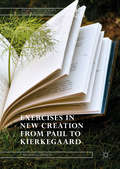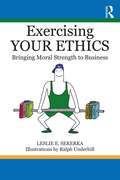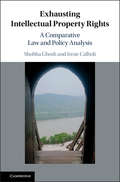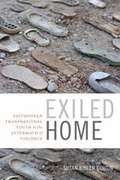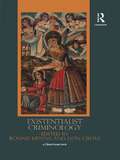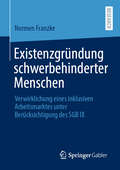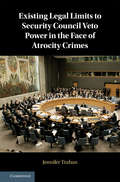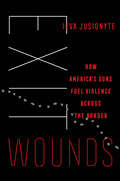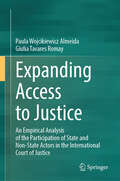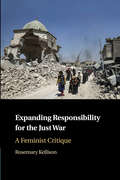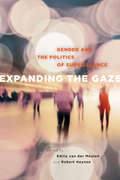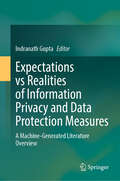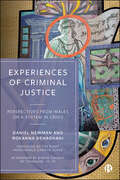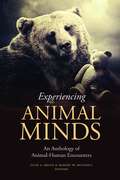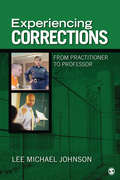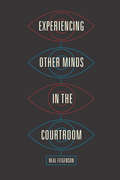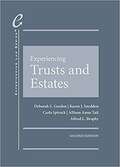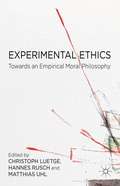- Table View
- List View
Exercises in New Creation from Paul to Kierkegaard (Radical Theologies and Philosophies)
by T. Wilson DickinsonThis book unfolds a vision for philosophical theology centered on the practices of the care of the self, the city, and creation. Rooted in Paul’s articulation of the wisdom of the cross, and in conversation with ecological, radical, and political theologies; continental philosophy; and political ecology, it addresses the challenge of injustice and ecological catastrophe. Part one reads 1 Corinthians as an exercise in reading and writing that shapes and changes relationships and capabilities. Part two follows this alternative path for theology through Derrida and Kierkegaard, and neglected trajectories in Origen, Augustine, and Luther. Along the way, reading and writing are explored as exercises that transform selves, communities, and even habitats. They are creaturely acts that can scandalize the dominant orders of consumption and competition for the ends of love and justice. This is a philosophical theology engaged with political ecology, exercises that help cultivate new creation.
Exercising Your Ethics: Bringing Moral Strength to Business
by Leslie E. SekerkaThrough a witty and engaging style the author invites readers to consider their character authenticity at work. The book is for people who want to do the right thing, but may not be sure what that means, how to go about it, or how to withstand the forces that may push them away from wanting to be ethical. In a world that seems to reward winning, regardless of how it is achieved, we need a clearer reason for wanting to be and become our best selves. Poking fun at the ironies and hypocrisies of human behavior, Exercising Your Ethics prompts you to leverage techniques that will help you become more deliberate about choosing value-driven actions. Exercising Your Ethics explains the messy business of workplace ethics in a way that is relatable and relevant. Readers will learn to build moral strength and encourage its development in others, while also recognizing moral vulnerability traps. It is an ideal resource for adult business education and training in academic or organizational settings. Educators, HR professionals, team leaders, coaches, and trainers will find the book a guide for competency development and as a way to prompt reflective discourse. Illustrator Ralph Underhill produces cartoons for a diverse number of social and environmental movements. He has a particular interest in using artistic communications to motivate positive change.
Exhausting Intellectual Property Rights: A Comparative Law and Policy Analysis
by Shubha Ghosh Irene CalboliEven as globalization seems to be in retreat in political circles, the march of commercialization and markets continues. Government policies, whether tariffs, exits, or walls, cannot impede the competitive drive to meet consumer demand for products and services, whether within national boundaries or across them. In the sphere of intellectual property rights, the doctrine of exhaustion serves to limit the rights of intellectual property owners after a specific exercise of some or all of the rights. This volume provides an assessment of the successes and failures of the exhaustion doctrine as it has been applied through recent judicial decisions in the United States and the European Union. Irene Calboli and Shubha Ghosh explore how evolving interpretations of the exhaustion doctrine affects the large trade in gray market products and other international trade issues. A comparative approach to exhaustion, Exhausting Intellectual Property Rights offers a unique discussion of the often overlooked issue of overlapping rights.
Exhibiting Atrocity: Memorial Museums and the Politics of Past Violence
by Amy SodaroToday, nearly any group or nation with violence in its past has constructed or is planning a memorial museum as a mechanism for confronting past trauma, often together with truth commissions, trials, and/or other symbolic or material reparations. Exhibiting Atrocity documents the emergence of the memorial museum as a new cultural form of commemoration, and analyzes its use in efforts to come to terms with past political violence and to promote democracy and human rights. Through a global comparative approach, Amy Sodaro uses in-depth case studies of five exemplary memorial museums that commemorate a range of violent pasts and allow for a chronological and global examination of the trend: the U.S. Holocaust Memorial Museum in Washington, DC; the House of Terror in Budapest, Hungary; the Kigali Genocide Memorial Centre in Rwanda; the Museum of Memory and Human Rights in Santiago, Chile; and the National September 11 Memorial Museum in New York. Together, these case studies illustrate the historical emergence and global spread of the memorial museum and show how this new cultural form of commemoration is intended to be used in contemporary societies around the world.
Exhuming Violent Histories: Forensics, Memory, and Rewriting Spain’s Past
by Nicole IturriagaMany years after the fall of Franco’s regime, Spanish human rights activists have turned to new methods to keep the memory of state terror alive. By excavating mass graves, exhuming remains, and employing forensic analysis and DNA testing, they seek to provide direct evidence of repression and break through the silence about the dictatorship’s atrocities that persisted well into Spain’s transition to democracy.Nicole Iturriaga offers an ethnographic examination of how Spanish human rights activists use forensic methods to challenge dominant histories, reshape collective memory, and create new forms of transitional justice. She argues that by grounding their claims in science, activists can present themselves as credible and impartial, helping them intervene in fraught public disputes about the remembrance of the past. The perceived legitimacy and authenticity of scientific techniques allows their users to contest the state’s historical claims and offer new narratives of violence in pursuit of long-delayed justice.Iturriaga draws on interviews with technicians and forensics experts and provides a detailed case study of Spain’s best-known forensic human rights organization, the Association for the Recovery of Historical Memory. She also considers how the tools and tactics used in Spain can be adopted by human rights and civil society groups pursuing transitional justice in other parts of the world. An ethnographically rich account, Exhuming Violent Histories sheds new light on how science and technology intersect with human rights and collective memory.
Exile, Murder and Madness in Siberia, 1823–61
by Andrew A. GentesDespite reports of exile proving disastrous to the region, 300,000 Russian subjects, from political dissidents to the elderly and mentally disabled, were deported to Siberia from 1823-61. Their stories of physical and psychological suffering, heroism and personal resurrection, are recounted in this compelling history of tsarist Siberian exile.
Exiled Home: Salvadoran Transnational Youth in the Aftermath of Violence
by Susan Bibler CoutinIn Exiled Home, Susan Bibler Coutin recounts the experiences of Salvadoran children who migrated with their families to the United States during the 1980-1992 civil war. Because of their youth and the violence they left behind, as well as their uncertain legal status in the United States, many grew up with distant memories of El Salvador and a profound sense of disjuncture in their adopted homeland. Through interviews in both countries, Coutin examines how they sought to understand and overcome the trauma of war and displacement through such strategies as recording community histories, advocating for undocumented immigrants, forging new relationships with the Salvadoran state, and, for those deported from the United States, reconstructing their lives in El Salvador. In focusing on the case of Salvadoran youth, Coutin's nuanced analysis shows how the violence associated with migration can be countered through practices that recuperate historical memory while also reclaiming national membership.
Existential Flourishing: A Phenomenology of the Virtues
by Irene McMullinThis innovative volume argues that flourishing is achieved when individuals successfully balance their responsiveness to three kinds of normative claim: self-fulfilment, moral responsibility, and intersubjective answerability. Applying underutilised resources in existential phenomenology, Irene McMullin reconceives practical reason, addresses traditional problems in virtue ethics, and analyses four virtues: justice, patience, modesty, and courage. Her central argument is that there is an irreducible normative plurality arising from the different practical perspectives we can adopt - the first-, second-, and third-person stances - which each present us with different kinds of normative claim. Flourishing is human excellence within each of these normative domains, achieved in such a way that success in one does not compromise success in another. The individual virtues are solutions to specific existential challenges we face in attempting to do so. This book will be important for anyone working in the fields of moral theory, existential phenomenology, and virtue ethics.
Existentialist Criminology
by Ronnie Lippens Don CreweExistentialist Criminology captures an emerging interest in the value of existentialist thought and concepts for criminological work on crime, deviance, crime control, and criminal justice. This emerging interest chimes with recent social and cultural developments - as well as shifts in their theoretical consideration - that are oriented around contingency and unpredictability. But whilst these conditions have largely been described and analysed through the lens of complexity theory, post-structuralist theory and postmodernism, there exploration by critical criminologists in existentialist terms offers a richer and more productive approach to the social and cultural dimensions of crime, deviance, crime control and, more broadly, of regulation and governance. Covering a range of topics that lend themselves quite naturally to existentialist analysis - crime and deviance as becoming and will, the existential openness of symbolic exchange, the internal conversations that take place within criminal justice practices, and the contingent and finite character of resistance - the contributions to this volume set out to explore a largely untapped reservoir of critical potential.
Existenzgründung schwerbehinderter Menschen: Verwirklichung eines inklusiven Arbeitsmarktes unter Berücksichtigung des SGB IX
by Normen FranzkeBehinderte Menschen haben einen Anspruch auf Nachteilsausgleiche, um die Teilhabe am Arbeitsleben zu fördern. Dies schließt auch eine selbständige Tätigkeit mit ein. Welche Nachteilsausgleiche gibt es und erhöhen sie die Chancen einer Teilhabe? Das Buch gibt Auskunft über Fördermechanismen im Sinne eines Nachteilsausgleiches für eine Existenzgründung und zur Sicherung einer Selbständigkeit. Dabei werden die Anspruchsvoraussetzungen, der Umfang und die Wirkung des Nachteilsausgleiches dargestellt.
Existing Legal Limits to Security Council Veto Power in the Face of Atrocity Crimes
by Jennifer TrahanIn this book, the author outlines three independent bases for the existence of legal limits to the veto by UN Security Council permanent members while atrocity crimes are occurring. The provisions of the UN Charter creating the veto cannot override the UN's 'Purposes and Principles', nor jus cogens (peremptory norms of international law). There are also positive obligations imposed by the Geneva and Genocide Conventions in situations of war crimes and genocide - conventions to which all permanent members are parties. The author demonstrates how vetoes and veto threats have blocked the Security Council from pursuing measures that could have prevented or alleviated atrocity crimes (genocide, crimes against humanity, war crimes) in places such as Myanmar, Darfur, Syria, and elsewhere. As the practice continues despite regular condemnation by other UN member states and repeated voluntary veto restraint initiatives, the book explores how the legality of this practice could be challenged.
Exit Wounds: How America's Guns Fuel Violence across the Border (California Series in Public Anthropology #57)
by Ieva JusionyteTurns the familiar story of trafficking across the US-Mexico border on its head, looking at firearms smuggled south from the United States to Mexico and their ricochet effects. American guns have entangled the lives of people on both sides of the US-Mexico border in a vicious circle of violence. After treating wounded migrants and refugees seeking safety in the United States, anthropologist Ieva Jusionyte boldly embarked on a journey in the opposite direction—following the guns from dealers in Arizona and Texas to crime scenes in Mexico. An expert work of narrative nonfiction, Exit Wounds provides a rare, intimate look into the world of firearms trafficking and urges us to understand the effects of lax US gun laws abroad. Jusionyte masterfully weaves together the gripping stories of people who live and work with guns north and south of the border: a Mexican businessman who smuggles guns for protection, a teenage girl turned trained assassin, two US federal agents trying to stop gun traffickers, and a journalist who risks his life to report on organized crime. Based on years of fieldwork, Exit Wounds expands current debates about guns in America, grappling with US complicity in violence on both sides of the border.
Exonerated: The Failed Takedown of President Donald Trump by the Swamp
by Dan BonginoFrom the New York Times bestselling author of SPYGATE <P><P>An explosive, whistle-blowing expose, Exonerated: The Failed Takedown of Donald Trump by the Swamp reveals how Deep State actors relied on a cynical plug-and-play template to manufacture the now-discredited Russiagate scandal. <P><P>With the cutting analysis and insight he exhibited in his blockbuster bestseller Spygate: The Attempted Sabotage of Donald J. Trump, Fox News contributor Bongino exposes who masterminded the dangerous playbook to take down Trump, their motives, and how a plan filled with faked allegations backfired—forcing investigators to up the ante and hide their missteps and half-truths in a desperate effort to prove a collusion case that never happened. <P><P>The result? The misguided multimillion Mueller investigation that tore the nation apart, tried to destabilize the presidency and led, as the world now knows, to nowhere! <P><P><b>A New York Times Bestseller</b>
Expanding Access to Justice: An Empirical Analysis of the Participation of State and Non-State Actors in the International Court of Justice
by Paula Wojcikiewicz Almeida Giulia Tavares RomayThis book addresses the repercussions of expanded participation in international judicial decision-making by investigating community interest issues. Focusing on the International Court of Justice (ICJ), the book reveals the growing involvement – formal and/or informal – of State and non-State actors (NSAs) in the ICJ’s contentious and advisory functions. This includes the participation of States, intergovernmental organisations (IGOs) and NSAs, i.e., non-governmental organisations (NGOs) and individuals. The book concentrates on the role and multifunctional character of international courts and tribunals (ICTs). As a component of the international governance structure, ICTs are equipped to protect, express and shape values that reflect community interests by the power granted them in international treaties. They can also be considered a key element for promoting the international rule of law, including the provision of global public goods. Public interest litigation is often used as a vehicle to advance human rights at the national and international level. As the main judicial organ of the UN, the participation of State and NSAs in ICJ proceedings is a subject of the utmost importance to international dispute settlement in general. The decisions delivered by the World Court can help to pursue community interests, for instance by setting internationally relevant precedents or concepts as obiter dicta. By applying an empirical research methodology to map ICJ practices concerning notifications, submissions and/or applications of State and NSAs, as well as other forms of submitting relevant information to the Court under the ICJ Statute and Rules, the book addresses the potential and limitations of expanded participation in the ICJ’s contentious cases and advisory proceedings. The analysis employs broad definitions of "participants" and "participation" in order to reflect the contemporary dynamics of the actors involved in international practice.
Expanding Responsibility for the Just War: A Feminist Critique
by Rosemary KellisonAs demonstrated in any conflict, war is violent and causes grave harms to innocent persons, even when fought in compliance with just war criteria. In this book, Rosemary Kellison presents a feminist critique of just war reasoning, with particular focus on the issue of responsibility for harm to noncombatants. Contemporary just war reasoning denies the violence of war by suggesting that many of the harms caused by war are necessary, though regrettable, injuries for which inflicting agents bear no responsibility. She challenges this narrow understanding of responsibility through a feminist ethical approach that emphasizes the relationality of humans and the resulting asymmetries in their relative power and vulnerability. According to this approach, the powerful individual and collective agents who inflict harm during war are responsible for recognizing and responding to the vulnerable persons they harm, and thereby reducing the likelihood of future violence. Kellison's volume goes beyond abstract theoretical work to consider the real implications of an important ethical problem.
Expanding the Gaze: Gender and the Politics of Surveillance
by Emily van der Meulen Robert HeynenFrom sexualized selfies and hidden camera documentaries to the bouncers monitoring patrons at Australian nightclubs, the ubiquity of contemporary surveillance goes far beyond the National Security Agency's bulk data collection or the proliferation of security cameras on every corner.Expanding the Gaze is a collection of important new empirical and theoretical works that demonstrate the significance of the gendered dynamics of surveillance. Bringing together contributors from criminology, sociology, communication studies, and women's studies, the eleven essays in the volume suggest that we cannot properly understand the implications of the rapid expansion of surveillance practices today without paying close attention to its gendered nature. Together, they constitute a timely interdisciplinary contribution to the development of feminist surveillance studies.
Expanding the Palace of Torah: Orthodoxy and Feminism
by Tamar Ross"Expanding the Palace of Torah offers a broad philosophical overview of the challenges the women's revolution poses to Orthodox Judaism, and Orthodox Judiasm's response to those challenges. Writing as an insider (herself an Orthodox Jew), Ross seeks to develop a theological response that fully acknowledges the male bias of Judaism's sanctified texts, yet nevertheless provides a rational for transforming that bias in today's world without undermining their authority. She proposes an approach to divine revelation-- the theological heart of traditional Judaism-- which she calls "cumulativism." This approach is based on a conflating of strict boundaries between text and its interpretation, or the divine intent and the evolution of human understanding." "Ross believes that the greater fluidity afforded by cumulativism is necessary for legitimizing the insights of feminism and fully absorbing women's changed status within the religious rubric of Jewish tradition. Emphasizing that continuity with tradition can be maintained only when the halakhic system is understood as a living organism that grows via affirmation of its historical legacy and respect for its constraints, her book shows that the feminist revolution in Orthodox Judaism reaches beyond its practical effect upon individual lives to teach us something more profound about the nature of religious practice in general." -- Amy Gottlieb Zorn berg (from the back cover)
Expectations vs Realities of Information Privacy and Data Protection Measures: A Machine-Generated Literature Overview
by Indranath GuptaThis book is a machine-generated literature overview of the legal and ethical debates over privacy and data protection measures in the last three decades, showcasing the expectations vis-à-vis realities of their presence and application in different sectors. The book identifies the role and application of consent in different situations. Over time, consent in its various forms and types, informed, explicit and otherwise, ensured data subjects have a measured understanding of the purpose of data processing. The idea of consent with time has been challenging to implement with the rapid advancement of research in different areas. It remains the most critical fulcrum, yet there are instances when the implementation continues to challenge. Owing to the nature of this sub-discipline, it remains a work in progress yet portrays a comprehensive range of issues. The entire narrative is being explored through two such machine-generated overview volumes and this is the firstof the two. These volumes have consciously tried to remain both jurisdictional and technology neutral while considering a range of data protection and privacy issues. Towards that end, this book has chapters that capture overarching issues about data protection and privacy; conceptualizes data protection from different perspectives and its existing debates with other rights and developments in a democratic society; provides a snapshot of developments happening in various jurisdictions and how data protection framework engages with other laws. It also broaches the critical issue of consent and how consent as a requirement has evolved and integrated with health research and other allied areas. The subsequent volume, titled &‘Operationalizing Expectations and Mapping Challenges of Information Privacy and Data Protection Measures in the Last Three Decades&’, would focus on different sectors and how these sectors have been tackling different expectations concerning data protection and privacy. It will also showcase how technology plays a catalyst in implementing data protection requirements. The book highlights the future research areas in the context of data protection and privacy. The volumes are an invaluable resource for not only researchers, but also policy makers, practitioners, corporate sector, across disciplines, and anyone looking to get an idea about the evolution of privacy, data protection issues and the application of consent over the last three decades since 1990.
Experiences of Criminal Justice: Perspectives From Wales on a System in Crisis
by Daniel Newman Roxanna DehaghaniAusterity continues to impact the criminal justice process in England and Wales: police numbers are down, the Crown Prosecution Service is in disarray, legal aid has been reduced, courts are closing and magistrates are leaving. Research into the criminal process usually focuses on England, however this book offers a rare insight into South Wales. Drawing on first-hand accounts of lawyers, police, suspects, and the convicted and their families, it uncovers how these affected individuals navigate the challenges caused by austerity, what has changed and what can be done to improve the system. This book is a reliable and evocative account of the reality of criminal justice in Wales.
Experiencing Animal Minds: An Anthology of Animal-Human Encounters
by Robert W. Mitchell. Julie A. SmithIn these multidisciplinary essays, academic scholars and animal experts explore the nature of animal minds ad the methods humans conventionally and unconventionally use to understand them. The collection features chapters by scholars working in psychology, sociology, history, philosophy, literary studies, and art as well as chapters by or about people who live or work with animals, including the founder of a sanctuary for chickens, a fur trapper, a popular canine psychologist, a horse trainer, and an art photographer who captures everyday contact between humans and their animal companions.
Experiencing Animal Minds: An Anthology of Animal-Human Encounters (Critical Perspectives on Animals: Theory, Culture, Science, and Law)
by Robert W. Mitchell. Julie A. Smith EdsIn these multidisciplinary essays, academic scholars and animal experts explore the nature of animal minds and the methods humans conventionally and unconventionally use to understand them. The collection features chapters by scholars working in psychology, sociology, history, philosophy, literary studies, and art, as well as chapters by and about people who live and work with animals, including the founder of a sanctuary for chickens, a fur trapper, a popular canine psychologist, a horse trainer, and an art photographer who captures everyday contact between humans and their animal companions.Divided into five sections, the collection first considers the ways that humans live with animals and the influence of cohabitation on their perceptions of animals' minds. It follows with an examination of anthropomorphism as both a guide and hindrance to mapping animal consciousness. Chapters next examine the effects of embodiment on animals' minds and the role of animal-human interembodiment on humans' understandings of animals' minds. Final sections identify historical representations of difference between human and animal consciousness and their relevance to pre-established cultural attitudes, as well as the ways that representations of animals' minds target particular audiences and sometimes produce problematic outcomes. The editors conclude with a discussion of the relationship between the book's chapters and two pressing themes: the connection between human beliefs about animals' minds and human ethical behavior, and the challenges and conditions for knowing the minds of animals. By inviting readers to compare and contrast multiple, uncommon points of view, this collection offers a unique encounter with the diverse perspectives and theories now shaping animal studies.
Experiencing Corrections: From Practitioner to Professor
by Lee M. JohnsonWritten by scholars who have practical experience in corrections, the readable essays in this one-of-a-kind collection draw on real-world experiences to illustrate theoretical and methodological concepts and demonstrate approaches to corrections practice. Spanning the three general types of correctional environments—incarceration, community corrections, and juvenile corrections—the essays discuss working in prisons or prison systems, juvenile residential and community corrections, and probation and parole.
Experiencing Other Minds in the Courtroom
by Neal FeigensonSometimes the outcome of a lawsuit depends upon sensations known only to the person who experiences them, such as the buzzing sound heard by a plaintiff who suffers from tinnitus after an accident. Lawyers, litigants, and expert witnesses are now seeking to re-create these sensations in the courtroom, using digital technologies to simulate litigants' subjective experiences and thus to help jurors know--not merely know about--what it is like to be inside a litigant's mind. But with this novel type of evidence comes a host of questions: Can anyone really know what it is like to have another person's sensory experiences? Why should courts allow jurors to see or hear these simulations? And how might this evidence alter the ways in which judges and jurors do justice? In Experiencing Other Minds in the Courtroom, Neal Feigenson turns the courtroom into a forum for exploring the profound philosophical, psychological, and legal ramifications of our efforts to know what other people's conscious experiences are truly like. Drawing on disciplines ranging from cognitive psychology to psychophysics to media studies, Feigenson harnesses real examples of digitally simulated subjective perceptions to explain how the epistemological value of this evidence is affected by who creates it, how it is made, and how it is presented. Through his close scrutiny of the different kinds of simulations and the different knowledge claims they make, Feigenson is able to suggest best practices for how we might responsibly incorporate such evidence into the courtroom.
Experiencing Trusts and Estates (Experiencing Law Series)
by Deborah Gordon Allison Tait Alfred Brophy Carla Spivack Karen SneddonThis textbook takes a learner-centered and experiential approach to trusts and estates law, which makes it well suited to teaching both online and face-to-face. The opening chapters introduce students to key concepts in intergenerational wealth transfer and planning for incapacity and death. The remainder of the book highlights inheritance law concepts from both a forward-looking (planning/drafting) and backward-looking (litigation) perspective. <p><P> The second edition continues to feature some of the most teachable trusts and estates cases, to focus on issues of gender, race, class, and sexuality, and to offer online student resources. New features of this edition include learning outcomes at the beginning of each chapter to help with ABA compliance and student focus, a broad and varied array of formative assessments, a glossary of terms, highlight boxes containing practice notes, connection notes, and language notes, and final chapter take-aways to link topics together. Some examples of assessments include; role playing exercises; drafting client letters and testamentary instruments; writing policy papers, legislation, and judicial opinions; and preparing community and client presentations. Each chapter also features more traditional hypotheticals, fact patterns, and discussion questions, extensive notes designed to help lead students through the major issues, and an appendix of sample documents.
Experimental Ethics
by Matthias Uhl Christoph Luetge Hannes RuschAcademic philosophy has experienced a major upheaval in the last decade. Venturous young philosophers, psychologists, and economists have begun to challenge the traditional stance that philosophy is an undertaking best pursued from the safety and calm of an arm-chair. Instead, they took the gloves off and brought philosophical questions to the experimental laboratory. This volume sets the stage for the development of a consistent theoretical framework for one of the branches of Experimental Philosophy: the empirical study of human moral reasoning, that is, Experimental Ethics. To this end it assembles contributions from philosophers, psychologists and cognitive scientists, economists, and sociologists active in this lively and growing field of research. These elaborate and substantiated works will enable its readers to immerse themselves into Experimental Ethics' history, its current topics and future perspectives, its methodology, and the criticism it is subject to.
